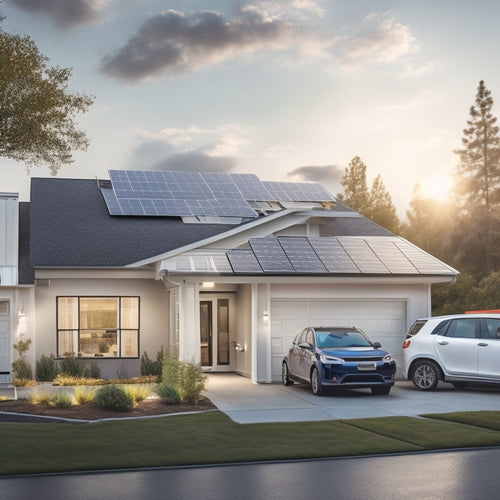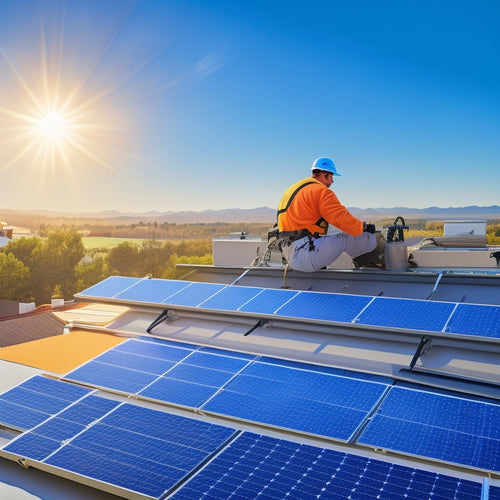
7 Things to Consider for Installing Solar Panels on Your Roof
Share
As you prepare to install solar panels on your roof, consider seven critical factors to guarantee a successful and cost-effective shift to renewable energy. You'll need to assess your roof's size, orientation, and potential shading to optimize energy output. Next, analyze your energy consumption patterns to determine the ideal system size. Familiarize yourself with local building codes, regulations, and incentives to guarantee compliance and maximize savings. Evaluate the quality and durability of solar panels, and carefully select a reputable installation company. Finally, investigate financing options and consider ongoing maintenance costs to guarantee a smooth and profitable solar energy expedition - and to get the most out of your investment.
Key Takeaways
- Consider your roof's size, orientation, and pitch to ensure optimal energy production and minimize shading obstructions.
- Assess your energy consumption patterns to determine the required system size and optimize panel placement for peak energy hours.
- Familiarize yourself with local building codes, zoning regulations, and permits required for a compliant installation.
- Evaluate solar panels based on efficiency, warranty, durability, and manufacturer reputation to ensure a high-quality installation.
- Research and compare installation companies based on certifications, experience, and cost estimation processes to find a credible installer.
Roof Size and Orientation
Determining your roof's size and orientation is essential when installing solar panels, as it directly affects the system's energy output.
You'll want to assess your roof's dimensions, including its length, width, and pitch. Roof pitch, in particular, plays a significant role in energy production, as a steeper pitch can increase energy output.
Conduct a shading analysis to identify any obstructions that might impact your solar panel system's performance. This includes trees, buildings, and other structures that cast shadows on your roof.
You'll want to verify that your solar panels receive ideal sunlight exposure throughout the day.
Local Building Codes Compliance
Your local government has its own set of building codes and regulations that you must comply with when installing solar panels on your property. These codes vary by region, so it's vital to familiarize yourself with the specific requirements in your area.
Zoning regulations, for instance, may dictate the size and placement of your solar panels, while permit requirements will need to be met before installation can begin. You'll need to obtain the necessary permits, which may include electrical and building permits, before commencing the installation process.
It's important to work with a reputable solar panel installer who's well-versed in local building codes and regulations. They can help you maneuver through the permitting process and guarantee that your installation meets all necessary requirements.
Additionally, your installer should be able to provide guidance on any local incentives or rebates that may be available for solar panel installations. By complying with local building codes and regulations, you'll guarantee a safe and efficient installation that meets your energy needs while also meeting local standards.
Energy Consumption Patterns
When you're planning to install solar panels, understanding your energy consumption patterns is essential.
You need to know your daily energy usage to determine the size of the solar panel system you'll require, and identifying your peak energy hours will help you optimize its performance.
Daily Energy Usage
As you investigate the world of solar panels, understanding your daily energy usage patterns is essential to determining the right system size for your needs. Your daily energy usage refers to the amount of electricity your household consumes on a typical day. This includes the energy required to power your appliances, lighting, and heating or cooling systems.
To assess your daily energy usage, you'll need to review your past electricity bills or track your energy consumption over a period of time. This will help you identify your energy-intensive appliances and habits, allowing you to enhance your energy efficiency before installing solar panels. By doing so, you can maximize the benefits of solar technology and reduce your reliance on the grid.
A thorough understanding of your daily energy usage will enable you to determine the ideal solar panel system size, ensuring that you generate enough electricity to meet your needs. This, in turn, will help you achieve peak energy efficiency and reduce your carbon footprint.
Peak Energy Hours
Peak energy hours, also referred to as energy consumption patterns, describe the periods of the day when your household's energy usage is at its highest. Understanding these patterns is essential when installing solar panels on your roof, as it directly affects your solar energy production.
You'll want to optimize your panel placement to match your peak energy hours, ensuring you generate the most energy when you need it most. Typically, peak energy hours occur during the morning and early evening when appliances, lighting, and HVAC systems are in heavy use.
Panel Quality and Durability
Your solar panel investment's long-term success hinges on the quality and durability of the panels themselves. You want to guarantee that the panels you choose will continue to perform at a high level for years to come.
One key factor to take into account is panel efficiency, which refers to the percentage of sunlight that's converted into electricity. Look for panels with high efficiency ratings to maximize your energy production.
Another critical aspect is warranty options. Reputable manufacturers typically offer warranties that cover the panels for 25 years or more. This provides peace of mind and protects your investment in case the panels fail or degrade prematurely.
Be certain to review the warranty terms and conditions carefully to understand what's covered and for how long.
When evaluating panel quality and durability, also take into account factors such as the materials used, the manufacturing process, and the panel's overall design.
High-quality panels may cost more upfront, but they'll likely provide better performance and last longer, ultimately saving you money in the long run.
Installation Company Credibility
You'll want to guarantee the installation company you choose has the necessary industry certifications, such as those from the North American Board of Certified Energy Practitioners (NABCEP).
Additionally, you should investigate the company's experience with projects similar to yours, including the type and size of solar panel systems they've installed.
Industry Certifications Held
When evaluating an installation company, one essential factor to take into account is the industry certifications they hold, as these credentials directly impact the quality of their work. You want to verify that the company you choose has the necessary proficiency to install your solar panels correctly and safely.
Look for certifications like the North American Board of Certified Energy Practitioners (NABCEP) certification, which is a gold standard in the industry. This certification confirms that the installation company has met rigorous training standards and has the knowledge and skills to install solar panels that meet your local building codes and safety requirements.
Additionally, check if the company is certified by the International Electrotechnical Commission (IEC) or the Underwriters Laboratories (UL). These certifications assure that the company's products and services meet international standards for safety and performance.
Experience With Similar Projects
Beyond industry certifications, a solar installation company's credibility is also established through their experience with similar projects. You want to know that the company has successfully completed projects like yours, with similar roof sizes, intricacies, and energy requirements.
Ask about their experience with projects similar to yours, and review their portfolio to get a sense of their capabilities.
When evaluating a company's experience, consider their cost estimation process. How do they determine the cost of the project, and what factors do they take into account? A company with experience in similar projects will be able to provide a more accurate cost estimation, helping you plan your budget more effectively.
You should also inquire about their project timeline management. How do they handle unexpected delays or changes to the project scope? A company with a proven track record of completing projects on time and within budget will be able to provide a more realistic project timeline, giving you peace of mind and helping you plan for the installation process.
Incentives and Financing Options
Government initiatives and private sector programs offer a range of incentives and financing options to encourage homeowners and businesses to invest in solar energy. You can benefit from federal tax credits, which allow you to claim a percentage of your solar panel installation costs as a credit on your tax return.
In addition, many states offer rebates that can help offset the upfront costs of installation. You can also investigate financing programs specifically designed for solar energy projects.
Solar loans, for instance, provide financing for your solar panel installation with competitive interest rates and repayment terms. Power purchase agreements (PPAs) and leasing options are alternative financing models that allow you to install solar panels with little to no upfront costs.
With PPAs, you purchase the electricity generated by the solar panels at a fixed rate, while leasing options involve renting the solar panels for a set period. Moreover, you may be eligible for energy efficiency upgrades and installation grants, which can help reduce the overall cost of your solar panel installation.
Ongoing Maintenance Costs
While you've likely factored in the initial investment of installing solar panels, it's equally important to take into account the ongoing maintenance costs associated with ensuring your system operates at peak performance.
Regular maintenance is vital to maximize energy production and extend the lifespan of your solar panels. You'll need to evaluate the cost of cleaning your panels, which can range from $100 to $300 per year, depending on the cleaning frequency. Additionally, you may need to replace inverters or other components over time, which can cost between $1,000 to $3,000.
Here's a breakdown of some typical maintenance costs:
| Task | Cost |
|---|---|
| Annual cleaning | $100 - $300 |
| Inverter replacement | $1,000 - $3,000 |
| Panel inspection and repair | $500 - $1,000 |
| Warranty coverage | Varies by provider |
It's essential to factor these costs into your overall budget and investigate warranty coverage options to minimize out-of-pocket expenses.
Frequently Asked Questions
Can I Install Solar Panels on a Metal or Tile Roof?
You can install solar panels on a metal or tile roof, but you'll need specialized mounting options designed for these roof materials, ensuring a secure and watertight fit that withstands environmental stresses.
Will Solar Panels Interfere With My Roof's Warranty?
As you envision a sustainable future, you wonder: will solar panels compromise your roof's warranty? Rest assured, you're protected if you follow installation guidelines; however, roof warranty implications may vary, so it's essential to review your contract carefully.
Can I Add More Panels to My System in the Future?
You can easily expand your solar panel system in the future by adding more panels, as long as you've planned for future expansion during initial installation, considering ideal panel placement to maximize energy output and roof space.
How Do Solar Panels Perform in Extreme Weather Conditions?
You'll find that solar panels are designed to withstand extreme weather conditions, with temperature effects on efficiency minimal, and storm resilience built in, so you can count on them to perform even in harsh environments.
Are Solar Panels Compatible With Satellite TV or Radio Antennas?
You guarantee ideal antenna signal reception by strategically planning solar panel placement, avoiding obstruction of the antenna's line of sight, and consulting with professionals to minimize signal interference for uninterrupted satellite TV and radio services.
Conclusion
As you commence on the voyage to utilize the sun's power, remember that installing solar panels on your roof is a bright idea that requires careful consideration. Don't get burned by overlooking vital details. By factoring in roof size and orientation, local building codes, energy consumption patterns, panel quality, installation company credibility, incentives, and ongoing maintenance costs, you'll be shining a light on a smart investment that will illuminate your path to energy independence.
Related Posts
-

What Electric Vehicle Owners Need for Home Energy
As an electric vehicle owner, you need to optimize your home energy system to guarantee efficient, sustainable, and c...
-

Top 10 Tips for Buying Car Accessories Online
When purchasing car accessories online, you should take proactive steps to avoid low-quality or incompatible products...
-

3 Essential Steps for Solar Electricity Installation
To guarantee a successful solar electricity installation, you'll need to follow three essential steps. First, assess ...


